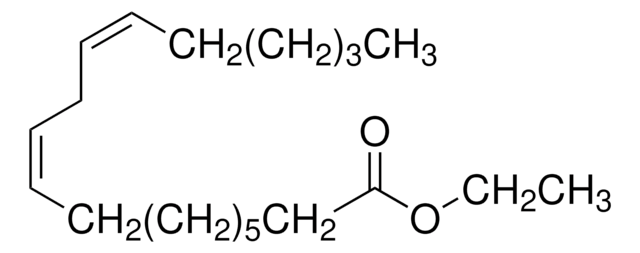311111
Methyl oleate
99%
Synonym(s):
Methyl cis-9-octadecenoate, Oleic acid methyl ester
About This Item
Recommended Products
vapor pressure
10 mmHg ( 205 °C)
Quality Level
Assay
99%
form
liquid
refractive index
n20/D 1.452 (lit.)
bp
218 °C/20 mmHg (lit.)
density
0.874 g/mL at 20 °C (lit.)
functional group
ester
storage temp.
−20°C
SMILES string
CCCCCCCC\C=C/CCCCCCCC(=O)OC
InChI
1S/C19H36O2/c1-3-4-5-6-7-8-9-10-11-12-13-14-15-16-17-18-19(20)21-2/h10-11H,3-9,12-18H2,1-2H3/b11-10-
InChI key
QYDYPVFESGNLHU-KHPPLWFESA-N
Looking for similar products? Visit Product Comparison Guide
General description
Application
- Epoxidized methyl oleate via epoxidation.
- Allyl azides via manganese(III) acetate-mediated addition of azide in the alkyl chain.
- Bromohydrin products via hydroxybromination with N-bromosuccinimide.
Storage Class Code
10 - Combustible liquids
WGK
WGK 1
Flash Point(F)
235.4 °F - closed cup
Flash Point(C)
113.0 °C - closed cup
Personal Protective Equipment
Regulatory Listings
Regulatory Listings are mainly provided for chemical products. Only limited information can be provided here for non-chemical products. No entry means none of the components are listed. It is the user’s obligation to ensure the safe and legal use of the product.
FSL
Group 4: Flammable liquids
Type 3 petroleums
Hazardous rank III
Water insoluble liquid
JAN Code
311111-5G:
311111-250G:
311111-VAR:
311111-25G:
311111-BULK:
Choose from one of the most recent versions:
Already Own This Product?
Find documentation for the products that you have recently purchased in the Document Library.
Customers Also Viewed
Our team of scientists has experience in all areas of research including Life Science, Material Science, Chemical Synthesis, Chromatography, Analytical and many others.
Contact Technical Service










